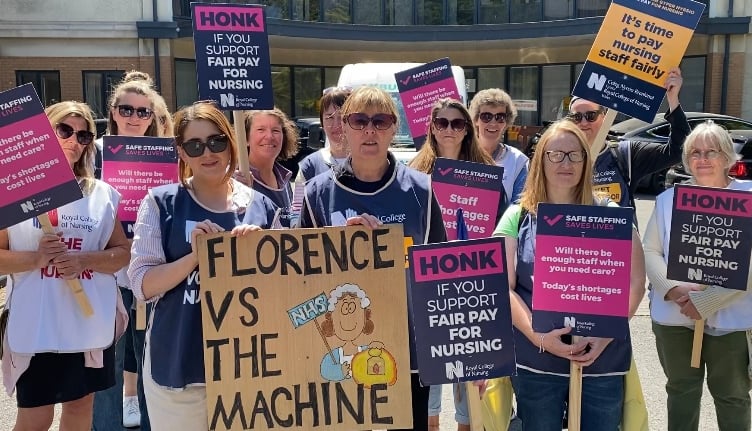Aberystwyth nurses are on strike once more over pay, conditions, patient care and the ‘future of the NHS’.
The latest action comes after a narrow majority of Royal College of Nursing (RCN) members voted (53 to 47 per cent) to reject the latest Welsh government NHS pay offer in a recent ballot.
Nurses across much of Wales took industrial action yesterday and today (7 June), which is causing greater disruption than the first round of strikes and having an impact on thousands of planned care appointments.
A picket line of nearly 20 staff members is gathered outside Bronglais Hospital in Aberystwyth, where weekend night shift staffing levels are currently in place.
RCN Wales representative and district nurse of 41 years, Yvonne Thomas, told the Cambrian News she is contracted to work a nine-and-a-half-hour day, four days per week, but she regularly starts at 7am and finishes at gone 9pm – and then has paperwork to do when she gets home.

When asked why the vote was so marginal this time and why fewer people appeared to be out striking, she said: “I think people have had pay rises and they’ve had so much money, but they don’t understand that the lower bandings get more money than the higher bandings.
“They’re selling it differently, so people think they’re getting more than they have, because once you get it in your pay packet it’s less by the time you pay tax, and your pension – because pension contributions have gone up.
“What we’re trying to do is get Band 5s who are newly qualified to get over £30,000 (per year) - and it’s the same with the doctors and the higher bands who aren’t getting enough.
“Our request is the same so that we can recruit and retain nurses and more staff in the wards and in the community so that we can maintain a high standard of care.
“It’s not all down to pay, it’s so we can keep more staff and keep the nurses that we’ve got – because they’re leaving for better pay outside of the NHS.
“They leave due to the stress of working without high staffing levels for patients on the ward.
“We’re striking for the future – and first and foremost to provide the care patients deserve.”
She said yesterday there were more than 30 staff members striking.
Ms Thomas said Aberystwyth University’s school of nursing is helping and is a ‘good development’ - but students can’t do placements because there isn’t the support available to give them a good basic nursing education standard.
The Royal College of Nursing - which hasn’t initiated strikes in more than a century - is demanding a pay rise of around eight per cent - which is lower than the five per cent above inflation it requested in previous rounds of talks.
The pay offer from the Welsh Government for 2022/23 is a 1.5 per cent increase and a 1.5 per cent one-off payment – which have already been paid out – as well as a further one-off ‘recovery payment’ which equates to three per cent on average.
For the year after, the offer includes a five per cent increase, which takes effect from April 2023.
Some unions such as UNISON, GMB and the Royal College of Midwives have accepted it, in part explaining why fewer people are on strike.
RCN Wales Director Helen Whyley, said: “Until the Minister for Health and Social Services re-opens meaningful negotiations to try to resolve our dispute, we will, once again, stand shoulder to shoulder on the picket lines across Wales.”
“Nursing makes up the largest portion of the NHS. The Welsh government should heed our concerns about patients’ safety and well-being and the nursing profession future.”
“Our statutory industrial action ballot for more strike action will open in early July.”
A Welsh Government spokesperson said: "While we recognise the strength of feeling among members, we are disappointed that strike action is continuing despite the collective decision to accept the Agenda for Change pay offer by the Wales Partnership Forum Business Committee.
“We are working with the NHS, unions and partners to ensure life-saving and life-maintaining care is provided during the industrial action, patient safety is maintained and disruption is minimised.
“But it is vital that all of us to do all we can to minimise pressure on our health service during the industrial action and consider carefully what activities we take part in. Anyone in immediate danger should call 999 and we encourage people to use the NHS 111 Wales website for health advice where there is no immediate threat to life, or speak to or visit a pharmacist, GP or minor injuries unit.”
.png?width=209&height=140&crop=209:145,smart&quality=75)



Comments
This article has no comments yet. Be the first to leave a comment.